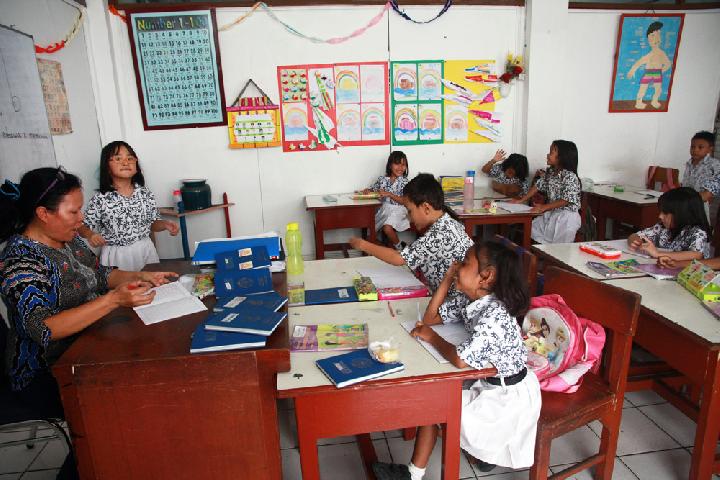A Place for Intercultural Curriculum in Our Education Reform
Translator
Editor
10 January 2020 17:15 WIB

By: Billy Nathan Setiawan | Billy Nathan Setiawan is an English teacher who will be commencing a PhD study at the University of South Australia in February 2020 with the Australian Government Research Training Program (RTP) scholarship
The newly appointed Minister of Education and Culture, Nadiem Makarim, has recently announced four educational policy programs in an attempt to reform and improve the quality of education in Indonesia. Dubbed ‘Merdeka Belajar’ or ‘freedom of learning’, the programs have gained both doubt and praise. The boldest of the four is that starting 2021, the national exam will be replaced by the Assessment of Minimum Competency and Survey of Character. The minimum competency covers three aspects: literacy, numeracy and character education. The Minister also stresses that ‘the world doesn’t need children who are good at memorizing’.
While many applaud this breakthrough, there is still a gap to be filled in our education systems. The nature of classrooms and schools in Indonesia should not be neglected when designing a new policy program. Classrooms in Indonesia consist of students from various cultural and religious backgrounds, bringing along complexity. Furthermore, preparing students to meet the world’s demand means that we need to prepare them to enter a new dimension or culture that may not be familiar. Indonesian children will be facing strong impacts of globalization, with many fear it threatens our values and systems of belief. One question remains: how to prepare our children to enter the globalized world and global competition while at the same time strengthening our identity as Indonesian? Thus, this article argues that intercultural education is a crucial aspect of education reform in Indonesia.
What is intercultural education? Intercultural education has been around for quite a while in Scandinavian countries, France, Germany and other European Union countries. The Council of Europe has been working on a lot of projects and resources in plurilingual and intercultural education. The term ‘intercultural communication’ and ‘intercultural education’ have emerged in response to global phenomena such as an increasing number of exchange students from one country to another, immigration, trades and global economy. Advancement of technology that enables easier communication among people from different countries or cultural backgrounds has also given a place for intercultural education to enhance.
Intercultural education values different opinions and views and opens to dialogue to mediate differences. Michael Bryam (1997) sets forth the skills, attitudes and knowledge (savoirs) in which intercultural education promotes such as knowledge of self and others, willingness to engage with people from different cultures in an equal relationship, interest in discovering other perspectives and willingness and readiness to suspend beliefs that one culture is better than the other. Furthermore, John Corbett (2003) states that the intercultural curriculum promotes a number of key values: ‘open-mindedness, curiosity, tolerance of difference, and respect for self and others’. Within intercultural education, students explore their own values while at the same time learning the values of others. Intercultural education teaches students to strengthen their own values while at the same time respecting different values of others. Within a properly implemented intercultural curriculum, learning others’ values should not threaten our own systems of belief.
Why do we need intercultural education? Intercultural education will give both internal and external impact. As stated above, schools in Indonesia consist of students from various backgrounds. Students bring along different values and beliefs that they have learned at home to the classroom. Our classrooms reflect a multicultural environment. It also reflects our national motto ‘Bhinneka Tunggal Ika’ (Unity in Diversity). The key values promoted in intercultural education will teach our children to be more tolerant of differences and respect people who come from different cultures. Within this framework, students will shape their ‘intercultural attitudes’, in which they learn to ‘suspend disbelief about other cultures and beliefs about one’s own’. Acquiring these attitudes will prevent our children from assuming that their cultures, religions, beliefs and other systems are better than of others. This is relevant to tackle intolerance in our diverse country.
Secondly, intercultural education will also prepare our children to enter the globalized world without diminishing their core identity. Globalization is inevitable. We are forced to improve our human capital index and global competitiveness while on the other hand we are also demanded to maintain our identity and culture as Indonesians. It is understood that when we come into a new culture, our attitudes and beliefs will naturally change. However, through the intercultural curriculum, students will learn to explore their own culture, beliefs, and attitudes so the new culture they encounter will not subjugate them. Rather, they will be prepared to be ‘intercultural diplomats’ – negotiators between divergent world-views of their own culture and of others.
Lastly, intercultural education is not merely abstract. A number of scholars such as Michael Byram, Genevive Zarate, Angela Scarino, Anthony Liddicoat, John Corbett etc have been working on designing intercultural curriculum and assessment. Considering challenges and dilemmas faced in our education and what intercultural education brings to the table, it is time for education practitioners, policymakers and other stakeholders in the education field in our country to consider a place for intercultural curriculum in our education reform.
DISCLAIMER
Articles published in the “Your Views & Stories” section of en.tempo.co website are personal opinions written by third parties, and cannot be related or attributed to en.tempo.co’s official stance























